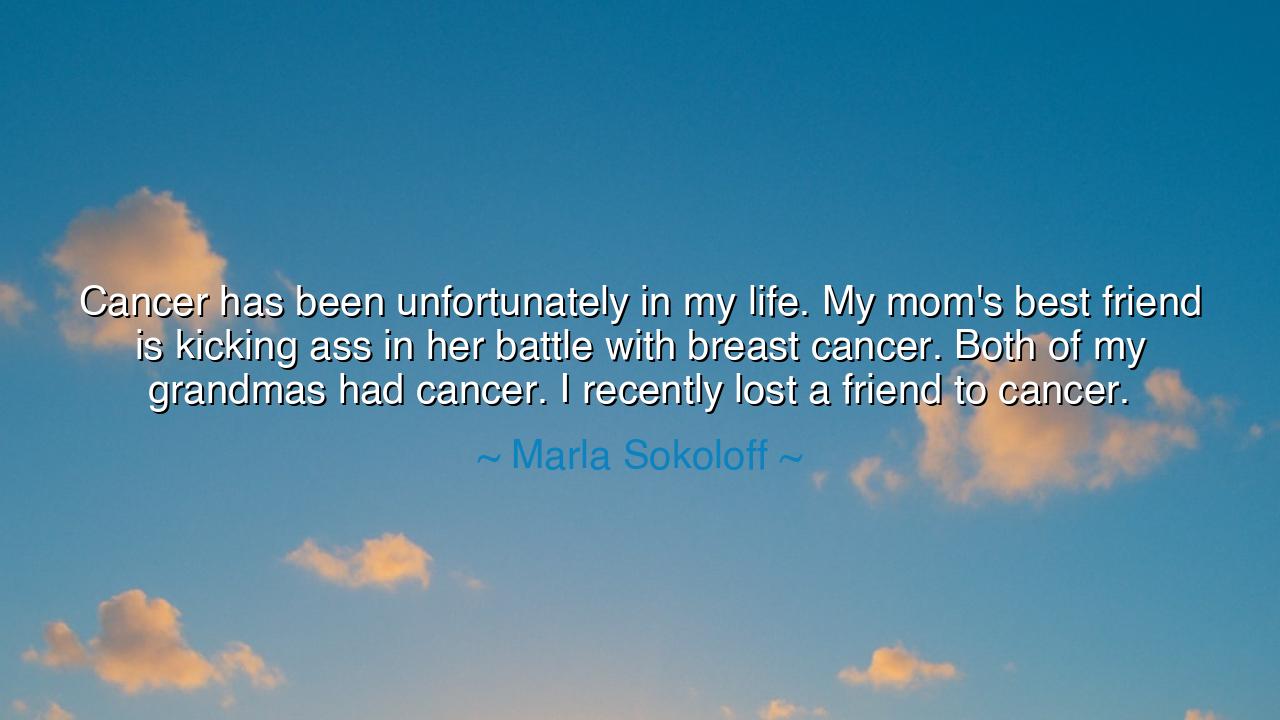
Cancer has been unfortunately in my life. My mom's best friend is
Cancer has been unfortunately in my life. My mom's best friend is kicking ass in her battle with breast cancer. Both of my grandmas had cancer. I recently lost a friend to cancer.






Hearken, O seekers of wisdom, and attend to the words of Marla Sokoloff, who speaks not from imagination but from the tender battlefield of life itself. “Cancer has been unfortunately in my life. My mom's best friend is kicking ass in her battle with breast cancer. Both of my grandmas had cancer. I recently lost a friend to cancer.” In this utterance lies the voice of one who has walked among both suffering and strength, who has witnessed the delicate dance between despair and courage. Hers are not words of theory but of testimony, born of proximity to pain, of the relentless confrontation with mortality that the disease forces upon all who encounter it.
At its heart, this reflection is a meditation on human resilience. For in naming her losses and battles, Sokoloff does not sink into bitterness; she honors the fight, the persistence of love in the shadow of loss. Her words remind us that illness is not merely a physical affliction, but a test of spirit—one that binds the living together through compassion, memory, and the shared will to endure. To speak of cancer in this way is to speak not only of suffering, but of valor—the valor of those who resist despair, who face the slow and terrifying march of illness with grace, defiance, and dignity.
Consider the story of Lance Armstrong, who, before scandal shadowed his name, became a symbol of endurance itself. Stricken with cancer that spread through his body, he did not yield to fear but instead transformed his suffering into a crusade for awareness and research. Though his later actions would complicate his legacy, his recovery and advocacy nonetheless demonstrated a truth that transcends reputation: that the human will, when ignited by purpose, can wrest triumph from the depths of agony. Sokoloff’s words echo this spirit of defiance—the spirit of those who “kick ass” in their battles, who rise each morning to fight again, not because they are unafraid, but because they love life enough to keep going.
Her reflection also speaks to the intergenerational reach of disease—the way it touches not one life but many. The mention of both her grandmothers, her mother’s friend, and her lost companion forms a tapestry of connection through shared struggle. It is a painful reminder that cancer is not confined by age or bloodline, that it weaves itself into families and friendships alike. Yet within that web of pain arises another truth: that love is stronger than disease, that even when bodies fail, memory and compassion continue the fight. The departed are not gone; they live in those who remember, who speak their names, who continue their work.
In the tone of her words, we also hear something profoundly human and unpretentious—the acknowledgment that pain coexists with pride, that sorrow can dwell alongside admiration. The phrase “kicking ass” breaks the solemnity with defiant energy, as if to say: this fight is not lost, nor is it purely tragic. There is light even in the dark corridors of illness—light found in laughter, in perseverance, in the simple act of waking each day and choosing to live fully despite uncertainty. Suffering may strike, but spirit endures.
From this, a lesson unfolds for all who listen: life’s fragility must awaken us to compassion, not fear. To know pain is to understand the sacredness of each day. If we have loved someone through illness, we know that kindness, presence, and courage are worth more than medicine alone. The call, then, is to be present—to visit, to comfort, to support, and to fight not only for recovery but for dignity. For while death may take the body, love transcends every ending.
Practical wisdom flows from Sokoloff’s words: cherish your health, nurture empathy, and recognize the invisible battles others endure. Volunteer for those in need, donate to causes that heal, and speak openly of your fears and hopes. Do not avert your gaze from pain, for to look upon it with love is the beginning of healing—not only for others, but for yourself.
Thus, let the words of Marla Sokoloff echo as both mourning and celebration: though cancer has marked her life with grief, it has also revealed the unbreakable thread of human strength. Through sorrow she teaches resilience, through loss she teaches love. Her testimony stands as a reminder to all generations that the heart’s capacity for courage is greater than any affliction, and that those who “kick ass” in their battles are heroes not only of medicine, but of the human spirit.






AAdministratorAdministrator
Welcome, honored guests. Please leave a comment, we will respond soon